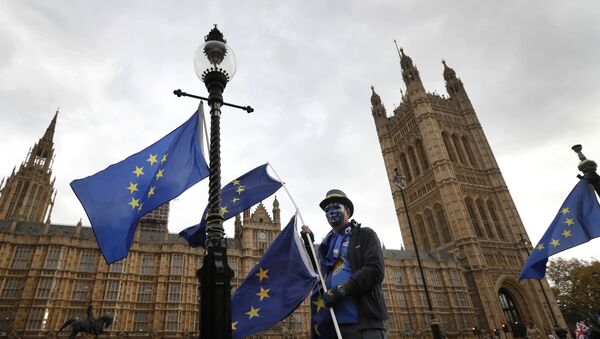Sputnik: Is there a danger that at some point the UK will find itself with laws that don’t actually apply, just don’t exist in certain areas of legislation?
Dr John Curtice: We are certainly relying on the ability of our civil servants to go through with a fine-tooth comb all the details of the European legislation and to make sure that it does work. But given what the bill does is literally downloading all the aspects of the European Union regulation into British law. In theory at least, apart from some technical difficulties, there should not be any gaps. Everything that is currently an EU law that we adhere to will become a British law which we will continue to adhere to.
READ MORE: Is Time Running Out on UK Premier or Could Pessimistic Growth Report Be Wrong?
Sputnik: What do you make of this conclusion by the House of Lords Constitution Committee and its timing?
Dr John Curtice: It’s not terribly surprising that the House Lords Constitution Committee should make the comments that is has done on the two subjects on which it’s focused. Basically what this bill tries to do is to say: hang on, we are going to leave the European Union, but there are now lots of laws and regulations that we follow.
And we have to initially download all these laws into the UK law and then subsequently we could work out how to change them. Now the problem is that along the way, some of the detailed UK-led European legislation which we tried to download will need amending. For example, it might refer to a European agency, like the European Medicines Agency, of which we will no longer be part, once we’ve left the European Union.
So there is a certain amount of amendment required. The argument is essentially about whether or not ministers should be allowed to use the procedure that basically says "well, we give Parliament notice of all of these amendments we want to make," but unless somebody kicks a big fuss there isn’t any opportunity for Parliament to vote on it.
Or should there be some areas where ministers actually have to go to Parliament and say: "these are the changes that we want to make and we are seeking our approval" – that’s essentially what the argument is about. The last of these procedures obviously is one that gives Parliament more control, the former warrant seems perhaps to give ministers the opportunity to change things, maybe beyond the scope of what they are claiming the arguments would be.
This was one of the arguments when the bill went through the House of Commons, it’s now about to go through the House of Lords. I don’t think we should be surprised as the Committee that consists of those with particular concern for the British constitution, should be raising questions about this and I don’t think we should be surprised if an attempt is made to amend the bill to some degree on this issue.
Issue number two is that there are certain areas like fishing, like farming, which are currently primarily run by the European union in the UK, but actually within the UK have already been devolved to the Scottish government, the Welsh government and the Northern Ireland Assembly. The argument there is: should the powers first go to Westminster and may be devolved further or should it go straight to the Scottish and Welsh government? That’s an ongoing row.
The truth is, on this issue the UK government has already conceded that the bill needs amending – it was meant to amend the bill in the House of Commons but it didn’t go around to doing it. We can guarantee that the bill will get amended in the House of Lords because if it doesn’t, the Scottish government will point it to the Welsh assembly, whose permission to change their powers is required, will otherwise block the measure […] I suspect the UK government will be minded at least to have something of a compromise on the issue.
The views and opinions expressed by Dr John Curtice are those of the speaker and do not necessarily reflect Sputnik's position.



